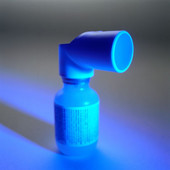- Could Your Grocery Store Meat Be Causing Recurring UTIs?
- Are You Making This Expensive Thermostat Error This Winter?
- Recognizing the Signs of Hypothyroidism
- 10 Strategies to Overcome Insomnia
- Could Artificial Sweeteners Be Aging the Brain Faster?
- Techniques for Soothing Your Nervous System
- Does the Water in Your House Smell Funny? Here’s Why
- Can a Daily Dose of Apple Cider Vinegar Actually Aid Weight Loss?
- 6 Health Beverages That Can Actually Spike Your Blood Sugar
- Treatment Options for Social Anxiety Disorder
New Inhaled Drug Shows Promise Against Asthma, Allergies


A new inhaled medication has the potential to treat mild asthma and allergies by interrupting the production of an immune system protein that triggers allergic reactions, a new study reports.
The drug, quilizumab, targets the blood cells that produce a protein called immunoglobulin type E (IgE), that serves a key role in allergies.
Quilizumab lowered total levels of IgE in the blood of people with allergies and mild asthma, and kept them low for a month, researchers report in the July 2 issue of the journal Science Translational Medicine.
“The subjects who received the drug not only had a reduction in their total IgE level, it also seemed to block production of new IgE in response to the allergen they inhaled,” said study co-author Dr. Jeffrey Harris, principal medical director of immunology, tissue growth and repair for the drug manufacturer Genentech, which produces quilizumab and funded the study.
However, one expert noted that the drug has yet to prove itself against moderate to severe asthma.
IgE is present in minute amounts in the body, but plays a major role in allergic diseases.
The protein binds to allergens upon first exposure, and then triggers the release of inflammatory substances when a person is re-exposed to the same allergens, creating an allergic response and, potentially, an asthma attack.
There currently is only one medication that specifically targets IgE, an injectable drug called omalizumab that binds to the protein in the bloodstream and neutralizes it.
Experts say quilizumab has the potential to replace the existing drug because it is more convenient and longer lasting.
Patients on omalizumab must receive one to three injections every two to four weeks, Harris said. If quilizumab proves as effective as it was in this early study, patients may only need to inhale a dose every three months or so.
“This could be very exciting, if it works,” said Dr. Bradley Chipps, an allergist in Sacramento, Calif. “It could be even more effective than omalizumab, which binds to IgE after it’s produced. This drug tries to keep it from being produced.”
Researchers tested the drug in one group of 36 allergy patients and another group of 29 people with mild asthma, randomly giving patients either quilizumab or an inactive placebo. In the study, patients were exposed to allergens and then blood samples were taken to measure levels of IgE in their bloodstream.
Quilizumab reduced overall levels of IgE, and also reduced the amount of IgE that specifically targeted the allergens to which patients were exposed, the study found. Further, the IgE levels remained lower for at least six months following the patients’ last dose of the drug.
However, the drug did not have a significant effect on the early and late asthmatic responses in patients after they were exposed to an allergen, compared to placebo, said Dr. Myron Zitt, an allergist and associate professor at State University of New York, Stony Brook.
“It is interesting because it is a new drug that blocks IgE production, but when you look at the figures, it’s not so impressive,” Zitt said, adding that quilizumab will have to display effectiveness in treating people with moderate to severe asthma if it stands a chance of replacing either omalizumab or standard steroid treatment.
Study author Harris said a follow-up clinical trial involving 560 people with more severe asthma is underway, with results likely available next year.
More information
For more on immunoglobulin E, visit the Asthma and Allergy Foundation of America.
Source: HealthDay
Copyright © 2026 HealthDay. All rights reserved.










